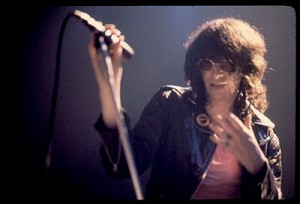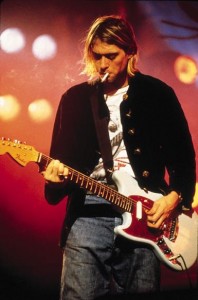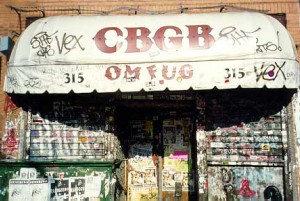In the news report above, two reporters try to explain the punk scene versus the new wave music scenes of Seattle in 1981. Although the report was pretty shallow, it also tried to discredit punk the way almost all the media did at the time. The reporters mentioned punk bands liked to use shock tactics like naming their bands shocking names like The Dead Kennedys and The Sex Pistols. They added that they had songs like “I Wanna Be Sedated” and “Let’s Lynch the Landlord.” If they listened to the lyrics to these songs they would understand that there was depth. “I Wanna Be Sedated” by The Ramones speaks of the lack of constructive choices for youth and how there’s nothing left to do but sedate themselves with drugs because their future looks bleak. As for “Let’s Lynch the Landlord” by The Dead Kennedys, the Kennedys are drawing attention to those living in poverty and forced into tenements managed by greedy landlords who won’t turn on the water or heat so they can squeeze as much profit from the rents as possible. Both songs are protests against the disenfranchisement of the poor and of poor youth in particular.
 Someone interviewed for this piece claimed that once these punks hit thirty years old, they stop being angry. That no one can stay angry forever. Obviously this person couldn’t see that a decade later a new music would explode out of punk called grunge and at the forefront was a band called Nirvana who sang an angry anthem called “Smells Like Teen Spirit.”
Someone interviewed for this piece claimed that once these punks hit thirty years old, they stop being angry. That no one can stay angry forever. Obviously this person couldn’t see that a decade later a new music would explode out of punk called grunge and at the forefront was a band called Nirvana who sang an angry anthem called “Smells Like Teen Spirit.”
Obviously this person couldn’t foresee that three decades later a mass protest would amass in New York City to protest exactly what the punk movement was protesting thirty years ago — the unequal distribution of wealth. Now that the middle class are being attacked and it’s not just the poor any more, people are waking up after being asleep for nearly five decades.
In 1981 Reagan told people you don’t have to worry about the poor. People are poor because they don’t work hard. You need to pull yourself up by your own bootstraps. Reaganomics worked great for those born with bootstraps. Those were the New wave kids in 1981. Those were the kids who came from families that had good paying jobs and could give their kids a future. The punks were the ones who couldn’t afford to go to college because Reaganomics systematically slashed federal funding for college educations. Reaganomics was clear that if you couldn’t afford college, don’t go. It wasn’t up to the government to pay for your education.
Punk was and still is a political movement as much as it is a musical movement. New Wave was simply dance music with a lot of synthesizer. Punk was a brutally honest form of music, stripped down to the bare bones of guitar, vocals and drums. It was fast and it was angry. New Wave was banal and anesthetized the listener into a false sense of well-being.
 Punk never really made it off of the college radio circuit whereas the banal new wave was all over commercial radio and is still heard today on commercial oldies stations, whereas punk is still “underground.” In 1981 Seattle KZAM Rock of the Eighties was yanked off the air in February. KCMU, the University of Washington’s radio station took over and played bands like The Dead Kennedys and The Ramones, among others. But KCMU was only ten watts strong and couldn’t be heard outside a ten-mile radius of the University of Washington.
Punk never really made it off of the college radio circuit whereas the banal new wave was all over commercial radio and is still heard today on commercial oldies stations, whereas punk is still “underground.” In 1981 Seattle KZAM Rock of the Eighties was yanked off the air in February. KCMU, the University of Washington’s radio station took over and played bands like The Dead Kennedys and The Ramones, among others. But KCMU was only ten watts strong and couldn’t be heard outside a ten-mile radius of the University of Washington.
This video report, like all other major media outlets, didn’t understand punk and therefore tried to discredit it. Instead of interviewing those who could be an articulate mouthpiece for what punk was really about, they interviewed drugged up people who gave shallow accounts of why they were punks.
The media has never wanted to acknowledge punk as either a viable music form or as a political entity. The media didn’t want you to think. If we started thinking, we wouldn’t be susceptible to the advertising that would make the corporations stronger. And so it was. Most people lapped up the music and TV shows that were spoon fed them and thought nothing of it. After 9-11 when Bush came on TV and told people to go out and buy an SUV because it would be patriotic, the sale of SUVs skyrocketed. By the end of George W. Bush’s term and after he wiped out any and all regulations for big business, the corporations were able to garner enough control over the country. They bought off politicians who returned the favor by looking away while the banks and other Wall Street firms to lied, cheated and stole their way to the biggest economic collapse since The Great Depression. Those same corporations were given a big bailout with no strings attached and have gone about doing what they did before the collapse. Now the middle class is being attacked. They’re losing their jobs, their homes, facing shrinking paychecks, etc. The middle class have now become the disenfranchised alongside the poor and they’re angry about the same things the punks were angry about thirty years ago. Now punks, middle class workers and elderly retired people are all marching together. Everyone is demanding the same things punks demanded thirty years ago. They all want a more even distribution of the wealth. Everyone wants a fair shake to achieve that American dream.
Nice article, Holly. You and I should host Point-Counterpoint. Re: political messages infused into new wave tunes were everywhere. Thomas Dolby’s “Windpower,” “Dissidents,” Mulu” immediately come to mind as sociopolitical statements. Dolby is top of mind for some reason, but there are a multitude of examples to compare with the punk movement. For me, punk was the angry voice of the movement; the sharp edge. New wave carried a more intellectual appeal without the angry. Both forms remain valid today.
While I agree you’re more likely to hear a political message from the punk side, to toss aside Wave as “simply dance music” ignores the facts as presented by the likes of China Crisis, Bill Nelson, Colourbox, Prefab Sprout, Shriekback, Tears for Fears, Depeche Mode, The Cure, Gang of Four, Talking Heads, The Police and more.
These bands all featured multiple forays into sociopolitical perspectives. If there could be a knock against Wave music in this regard, New Wavers often took progressive and positive views of their lot, imagining a better future in the middle of what these artists would have likely considered dystopian political landscape of the 80s.
Lack of American radio play for early punk rock led Seymour Stein of Sire Records to start calling his bands “new wave” in 1976, three years before synthpop became the new new wave. Many punk bands didn’t have politics, many new wavers (with or without synthesizers) did.
We can all laugh about clueless eighties television hosts reporting on punk rock. (There’s a Portland clip below.) What annoys me today is that “cutting edge” newspapers and radio stations mostly treat punk rock like a dated novelty, while they push hip-hop and soft rock (also products of the seventies). I understand that these styles have better sales figures, but if that determines your format, why claim to be alternative?
Steve Stav – I’ve always felt “punk” was hugely overrated. And a wide and widely interpreted genre… to me, for example, Eddie Cochran and the Sonics were original punksters. You can’t compare the commercially successful, but genius Ramones with say, the “hardcore” of DK or Minor Threat. And you can shout and play the same chords as loud as you want, but unless you have a song, not a whole lot of people are going to listen – no matter what. The Clash is a perfect example… and like the Ramones, not “punk” as JFA was “punk.” The Clash wrote “real songs” to go with the attitude. And as far as the trifecta of attitude, musicianship AND a huge dose of socio-political bite, you’d be hard-pressed to top The Jam in those days. And they weren’t “punk” as many think of the term. They were just badass.
And if you want to belabor the old “New Wave” vs. “Punk” argument, anybody who’s listened to a Devo record would agree they had important commentary to spare.
 Ben Easher – ”Punk rock” was a journalism term applied to anyone playing CBGB around 1975 (Heartbreakers, Television, Blondie, Ramones). These bands all sounded different but had nowhere else to play. The standardization of the “punk sound” started when the Sex Pistols became England’s flavor of the month. Later on, hardcore rigidly defined what was “punk” versus “selling out.” (Black Flag could write real songs, but they were criticized for having one over three minutes long!)
Ben Easher – ”Punk rock” was a journalism term applied to anyone playing CBGB around 1975 (Heartbreakers, Television, Blondie, Ramones). These bands all sounded different but had nowhere else to play. The standardization of the “punk sound” started when the Sex Pistols became England’s flavor of the month. Later on, hardcore rigidly defined what was “punk” versus “selling out.” (Black Flag could write real songs, but they were criticized for having one over three minutes long!)
Some people say politics and music don’t mix. It’s true that many musicians are high-school dropouts who don’t do much reading. Some adopt “radical” stances to offend their parents or get publicity (i.e., groupies), but eventually “grow up” to become Republicans. Even if a political band is sincere, they won’t hold my attention without intelligence, humor, and preferably some personal songs too.
Andrew Hamlin – …I notice nobody posted the definitive word on what punk is. Here’s that link:
http://www.poe-news.com/forums/sp.php?pi=1001418155
Clarificationally,
Andrew


